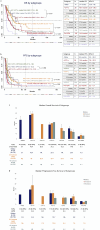The Impact of Radiation Dose and Tumour Burden on Outcomes in Hepatocellular Carcinoma: 11-Year Experience in a 413-Patient Cohort Treated with Yttrium-90 Resin Microsphere Radioembolisation
- PMID: 40255874
- PMCID: PMC12005707
- DOI: 10.1159/000541539
The Impact of Radiation Dose and Tumour Burden on Outcomes in Hepatocellular Carcinoma: 11-Year Experience in a 413-Patient Cohort Treated with Yttrium-90 Resin Microsphere Radioembolisation
Abstract
Introduction: Transarterial radioembolisation (RE) using yttrium-90 (Y-90) microspheres is a widely used locoregional therapy for a broad spectrum of hepatocellular carcinoma (HCC) given its favourable safety profile. We evaluated the real-world outcomes of unresectable HCC treated with resin Y-90 RE and the relationship between tumour absorbed dose and subsequent curative therapy with survival.
Methods: Included were consecutive patients treated with Y-90 resin microspheres RE for unresectable HCC between January 2008 and May 2019 at the National Cancer Centre Singapore/Singapore General Hospital. The outcomes were stratified by tumour burden, distribution, presence of portal vein invasion (PVI) and liver function to improve prognostication.
Results: The median overall survival (OS) evaluated on 413 included patients was 20.9 months (95% CI: 18.2-24.0). More than half of the patients (214/413, 51.8%) had HCC beyond up-to-seven criteria, and 37.3% had portal vein invasion (154/413, 37.3%). Majority (71.7%) had dosimetry calculated based on the partition model. Patients who received ≥150 Gy to tumour had significantly better outcomes (OS 32.2 months, 95% CI: 18.3-46.4) than those who did not (OS 17.5 months, 95% CI: 13.7-22.7, p < 0.001). Seventy patients (17%) received curative therapies after tumour was downstaged by Y-90 RE and had better OS of 79.7 months (95% CI: 40.4 - NE) compared to those who did not receive curative therapies (OS 17.1 months; 95% CI: 13.5-20.4, p < 0.001). RE-induced liver injury was observed in 5.08% of the patients while 3.2% of the patients had possible radiation pneumonitis but none developed Grade 3-4 toxicity. For HCC without PVI, OS differed significantly with performance status, albumin-bilirubin grade, tumour distribution, and radiation dose; for HCC with PVI, Child-Pugh class and AFP were significant predictors of survival.
Conclusions: Treatment outcomes for unresectable HCC using Y-90 RE were favourable. Incorporating tumour burden and distribution improved prognostication. Patients who received tumour absorbed dose above 150 Gy had better OS. Patients who subsequently received curative therapies after being downstaged by Y-90 RE had remarkable clinical outcomes.
Keywords: Downstage; Hepatocellular carcinoma; Liver cancer; Radioembolisation; Selective internal radiation therapy.
© 2024 The Author(s). Published by S. Karger AG, Basel.
Conflict of interest statement
David CE Ng received research funding from SIRTEX Medical, Bayer, Merck, Norvatis and Genzyme. Apoorva Gogna received honoraria as speaker/proctor from SIRTEX Medical. Chow Wei Too received honoraria as a proctor from SIRTEX Medical. Pierce KH Chow received honoraria from La Hoffman-Roche, SIRTEX Medical; research funding from Sirtex Medical, Ipsen, IQVIA, New B Innovation, AMiLi, Perspectum, MiRXES, La Hoffman-Roche; holds a consultancy or advisory role in Sirtex Medical, Ipsen, BMS, Oncosil, Bayer, New B Innovation, MSD, Guerbet, Roche, AUM Bioscience, L.E.K. Consulting, AstraZeneca, Eisai, Genentech, IQVIA, Abbott. The remaining authors have no conflicts to declare.
Figures




References
-
- Sung H, Ferlay J, Siegel RL, Laversanne M, Soerjomataram I, Jemal A, et al. . Global cancer statistics 2020: GLOBOCAN estimates of incidence and mortality worldwide for 36 cancers in 185 countries. CA Cancer J Clin. 2021;71(3):209–49. - PubMed
-
- Zhang CH, Cheng Y, Zhang S, Fan J, Gao Q. Changing epidemiology of hepatocellular carcinoma in Asia. Liver Int. 2022;42(9):2029–41. - PubMed
-
- Chew XH, Sultana R, Mathew EN, Ng DCE, Lo RHG, Toh HC, et al. . Real-world data on clinical outcomes of patients with liver cancer: a prospective validation of the national cancer centre Singapore consensus guidelines for the management of hepatocellular carcinoma. Liver Cancer. 2021;10(3):224–39. - PMC - PubMed
LinkOut - more resources
Full Text Sources

